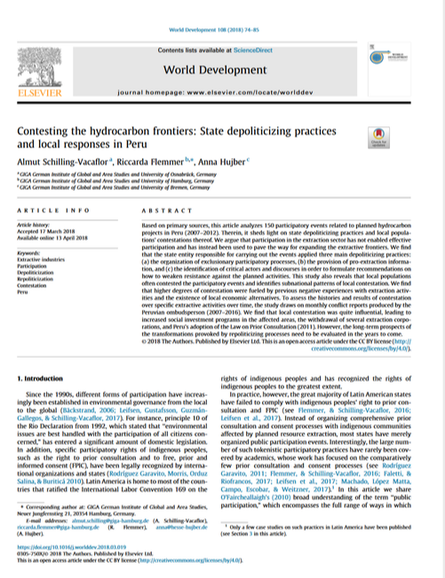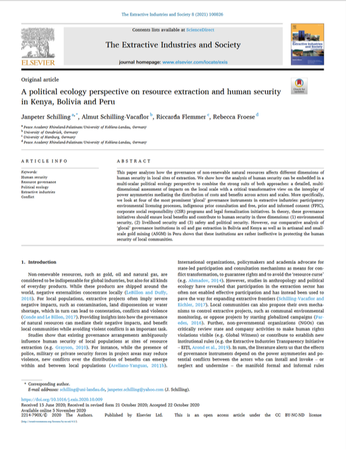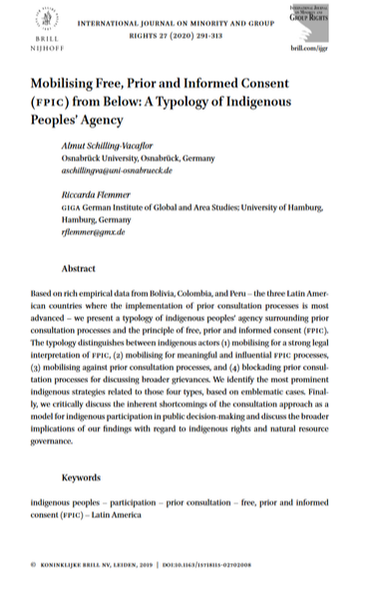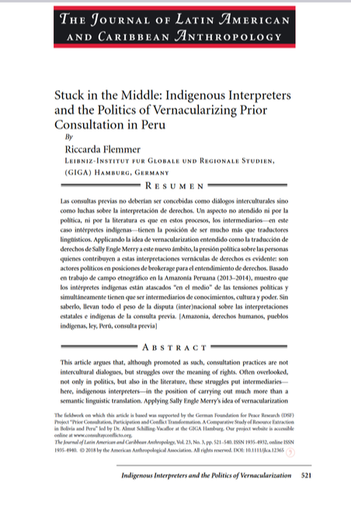‘A political ecology perspective on resource extraction and human security in Kenya, Bolivia and Peru‘ (2020)
|
Abstract
This paper analyzes how the governance of non-renewable natural resources affects different dimensions of human security in local sites of extraction. We show how the analysis of human security can be embedded in a multi-scalar political ecology perspective to combine the strong suits of both approaches: a detailed, multidimensional assessment of impacts on the local scale with a critical transformative view on the interplay of power asymmetries mediating the distribution of costs and benefits across actors and scales. More specifically, we look at four of the most prominent ‘glocal’ governance instruments in extractive industries: participatory environmental licensing processes, indigenous prior consultation and free, prior and informed consent (FPIC), corporate social responsibility (CSR) programs and legal formalization initiatives. In theory, these governance initiatives should ensure local benefits and contribute to human security in three dimensions: (1) environmental security, (2) livelihood security and (3) safety and political security. However, our comparative analysis of ‘glocal’ governance institutions in oil and gas extraction in Bolivia and Kenya as well as in artisanal and smallscale gold mining (ASGM) in Peru shows that these institutions are rather ineffective in protecting the human security of local communities. |
Schilling, Janpeter, Almut Schilling-Vacaflor, Riccarda Flemmer, and Rebecca Froese. 2021. “A Political Ecology Perspective on Resource Extraction and Human Security in Kenya, Bolivia and Peru.” The Extractive Industries and Society 8 (4): 1–12. (Open Access)
|
'Mobilising Free, Prior and Informed Consent (FPIC) from Below: A Typology of Indigenous Peoples' Agency' (2020)
|
Abstract
Based on rich empirical data from Bolivia, Colombia, and Peru – the three Latin American countries where the implementation of prior consultation processes is most advanced – we present a typology of indigenous peoples’ agency surrounding prior consultation processes and the principle of free, prior and informed consent (fpic). The typology distinguishes between indigenous actors (1) mobilising for a strong legal interpretation of fpic, (2) mobilising for meaningful and influential fpic processes, (3) mobilising against prior consultation processes, and (4) blockading prior consultation processes for discussing broader grievances. We identify the most prominent indigenous strategies related to those four types, based on emblematic cases. Finally, we critically discuss the inherent shortcomings of the consultation approach as a model for indigenous participation in public decision-making and discuss the broader implications of our findings with regard to indigenous rights and natural resource governance. |
Schilling-Vacaflor, Almut and Riccarda Flemmer (2020): ‘Mobilising Free, Prior and Informed Consent (FPIC) from Below: A Typology of Indigenous Peoples’ Agency.‘ International Journal on Minority and Group Rights 27: 291–313. (Link)
'Stuck in the Middle. Indigenous Interpreters and the Politics of Vernacularizing Prior Consultations in Peru' (2018)
|
Abstract
This article argues that, although promoted as such, consultation practices are not intercultural dialogues, but struggles over the meaning of rights. Often overlooked, not only in politics, but also in the literature, these struggles put intermediaries—here, indigenous interpreters—in the position of carrying out much more than a semantic linguistic translation. Applying Sally Engle Merry's idea of vernacularization as the translation of rights to this new ambit, the political pressure on vernacularizers becomes clear: they are political actors in positions of brokerage with regard to shaping the meaning of rights. Drawing on ethnographic fieldwork in the Peruvian Amazon (2013–2014), I show that indigenous interpreters are “stuck in the middle” of political tensions and must simultaneously serve as brokers of knowledge, culture, and power as they bear the weight of an (inter)national tug-of-war between state and indigenous interpretations of prior consultation. Flemmer, Riccarda (2018): ‘Stuck in the Middle. Indigenous Interpreters and the Politics of Vernacularizing Prior Consultations in Peru’; Journal of Latin American and Caribbean Anthropology, 23 (3): 521–540. doi: 10.1111/jlca.12365. (Link)
|
'Consenting the Hydrocarbon Frontiers: De-Politicizing State Strategies and Local Respones in Peru' (2007-2012)

Abstract
Based on primary sources, this article analyzes 150 participatory events related to planned hydrocarbon projects in Peru (2007–2012). Therein, it sheds light on state depoliticizing practices and local populations’ contestations thereof. We argue that participation in the extraction sector has not enabled effective participation and has instead been used to pave the way for expanding the extractive frontiers. We find that the state entity responsible for carrying out the events applied three main depoliticizing practices: (a) the organization of exclusionary participatory processes, (b) the provision of pro-extraction information, and (c) the identification of critical actors and discourses in order to formulate recommendations on how to weaken resistance against the planned activities. This study also reveals that local populations often contested the participatory events and identifies subnational patterns of local contestation. We find that higher degrees of contestation were fueled by previous negative experiences with extraction activities and the existence of local economic alternatives. To assess the histories and results of contestation over specific extractive activities over time, the study draws on monthly conflict reports produced by the Peruvian ombudsperson (2007–2016). We find that local contestation was quite influential, leading to increased social investment programs in the affected areas, the withdrawal of several extraction corporations, and Peru’s adoption of the Law on Prior Consultation (2011). However, the long-term prospects of the transformations provoked by repoliticizing processes need to be evaluated in the years to come.
Based on primary sources, this article analyzes 150 participatory events related to planned hydrocarbon projects in Peru (2007–2012). Therein, it sheds light on state depoliticizing practices and local populations’ contestations thereof. We argue that participation in the extraction sector has not enabled effective participation and has instead been used to pave the way for expanding the extractive frontiers. We find that the state entity responsible for carrying out the events applied three main depoliticizing practices: (a) the organization of exclusionary participatory processes, (b) the provision of pro-extraction information, and (c) the identification of critical actors and discourses in order to formulate recommendations on how to weaken resistance against the planned activities. This study also reveals that local populations often contested the participatory events and identifies subnational patterns of local contestation. We find that higher degrees of contestation were fueled by previous negative experiences with extraction activities and the existence of local economic alternatives. To assess the histories and results of contestation over specific extractive activities over time, the study draws on monthly conflict reports produced by the Peruvian ombudsperson (2007–2016). We find that local contestation was quite influential, leading to increased social investment programs in the affected areas, the withdrawal of several extraction corporations, and Peru’s adoption of the Law on Prior Consultation (2011). However, the long-term prospects of the transformations provoked by repoliticizing processes need to be evaluated in the years to come.
Schilling-Vacaflor, Almut; Flemmer, Riccarda and Anna Hujber (2018): ‘Contesting the Hydrocarbon Frontiers: De-Politicizing State Strategies and Local Responses in Peru (2007–2012)’; World Development, 108: 74–85. (Open Access)
Other Peer Reviwed Publications
- Flemmer, Riccarda and Almut Schilling-Vacaflor (2016): ‘Unfulfilled promises of the consultation approach: the limitations to effective indigenous participation in Bolivia’s and Peru’s extractive industries’; Third World Quarterly 37 (1): 172-188. (Link)
- Schilling-Vacaflor, Almut and Riccarda Flemmer (2015): ‘Conflict Transformation through Prior Consultation? Lessons from Peru’; Journal of Latin American Studies 47 (4): 811-839. (Link)
- Flemmer, Riccarda (2015): ‘Lecciones de los primeros procesos de la consulta previa en el sector de hidrocarburos en Perú’; Iberoamericana, 15 (58): 166-171. (Open Access).


